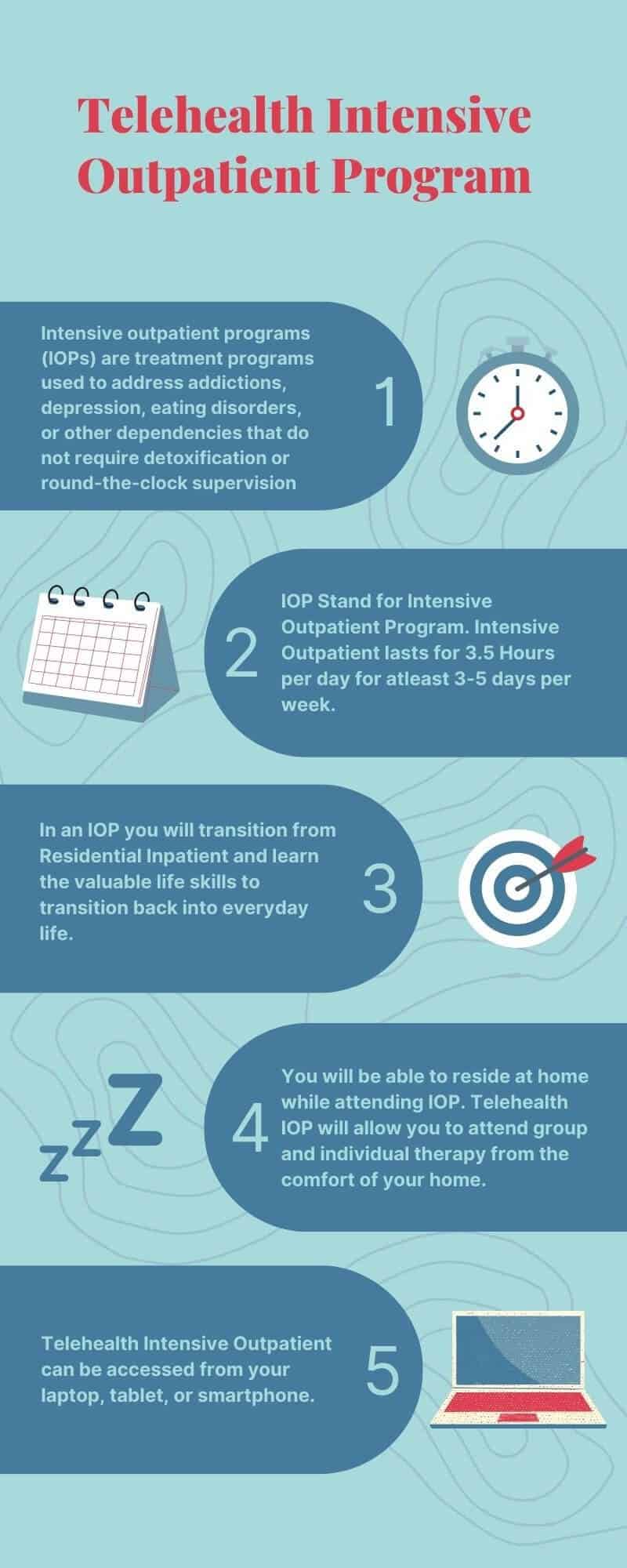The Advantages of Intensive Outpatient Program (IOP) for Long-Term Wellness.
The Advantages of Intensive Outpatient Program (IOP) for Long-Term Wellness.
Blog Article
Navigating the Intricacies of Twin Medical Diagnosis Therapy Within an Extensive Outpatient Program Establishing
In the realm of mental health and dependency treatment, the intersection of twin diagnosis presents a nuanced obstacle that demands an extensive and tailored approach. Within the boundaries of an Extensive Outpatient Program (IOP) setup, the complexities of resolving co-occurring psychological wellness disorders and material make use of conditions call for a fragile balance of know-how and sources to navigate. The assimilation of evidence-based practices, joint efforts amongst multidisciplinary groups, and a keen understanding of the unique demands of each individual are crucial parts in successfully handling dual medical diagnosis within an IOP structure. By checking out the complexities of dual medical diagnosis treatment within this extensive outpatient context, a more clear path emerges in the direction of holistic and lasting healing for those grappling with these intertwined obstacles.
Dual Diagnosis Introduction

Understanding twin diagnosis is crucial as it requires an extensive and incorporated strategy to treatment. By recognizing the interaction between compound usage and mental health and wellness, health care companies can customize treatments to fulfill the special requirements of each individual. This all natural approach not just addresses symptoms however additionally targets underlying elements that contribute to the twin medical diagnosis.
Furthermore, untreated twin diagnosis can lead to a cycle of regression and aggravating mental health and wellness signs and symptoms. By identifying the complexity of double medical diagnosis and giving specialized care, medical care specialists can sustain people in achieving long-lasting healing and boosted mental health.
Tailored Therapy Plans
Identifying the intricate interaction between substance use problems and mental health and wellness conditions, the growth of tailored treatment plans is extremely important in resolving the intricacies of twin diagnosis in psychological health and wellness treatment. Customized treatment strategies are individualized strategies that take into consideration the unique needs, challenges, and objectives of individuals encountering double diagnosis. These strategies are developed collaboratively by a multidisciplinary team of professionals, including psychoanalysts, psycho therapists, social employees, and dependency specialists, to ensure extensive and incorporated treatment.
Tailored therapy plans normally include a mix of treatments, medicines, and behavioral treatments that target both the substance usage problem and the psychological health and wellness condition simultaneously. These plans may include cognitive-behavioral treatment, dialectical actions treatment, medication-assisted therapy, individual therapy, group treatment, and household treatment, among other evidence-based treatments. By customizing treatment strategies to private circumstances, tailored plans can deal with the source of double diagnosis, advertise long-lasting recuperation, and enhance general top quality of life for individuals fighting with co-occurring disorders.
Integrated Treatment Technique
An integrated care method in double diagnosis therapy combines medical, emotional, and social treatments to address the intricate needs of individuals with co-occurring substance usage disorders and mental wellness conditions. This strategy acknowledges that treating one aspect of a double medical diagnosis without dealing with the other can lead to ineffective outcomes. By integrating clinical treatments such as medicine administration for psychological health and wellness problems with psychological therapies like cognitive-behavioral therapy for compound usage problems, people obtain extensive care that targets all aspects of their twin medical diagnosis.
Moreover, the social facet of integrated care includes attending to environmental variables that might add to the development or perpetuation of compound usage and psychological wellness problems. This can consist look these up of family members dynamics, real estate instability, or absence of social assistance. By including social treatments like family members therapy, trade assistance, and community resources, the treatment becomes much more all natural and customized to the individual's specific demands. Overall, an incorporated treatment approach in double diagnosis treatment within an extensive outpatient program setup aims to supply thorough, efficient, and customized care to people facing co-occurring conditions.
Difficulties in IOP Establishing
In the context of twin diagnosis treatment within an intensive outpatient program, browsing the intricacies of co-occurring compound use conditions and psychological health and wellness conditions offers substantial obstacles. One of the main difficulties in the IOP setup is the sychronisation of treatment in between psychological wellness experts and drug abuse specialists to ensure an extensive therapy technique. This requires reliable communication, collaboration, and a deep understanding of just how these conditions interact and affect each other.

Furthermore, resolving stigma and resistance to treatment within the IOP setup can restrain development. Some individuals may be reluctant to disclose their twin diagnosis or may really feel embarrassed, preventing their engagement in the therapeutic process. Conquering these barriers requires a supportive and non-judgmental setting that cultivates trust and openness.

Collaborative Expert Efforts
Efficient dual medical diagnosis therapy in an extensive outpatient program necessitates seamless partnership among psychological health and wellness specialists and substance misuse professionals to make sure a thorough and integrated technique to care. By functioning with each other, these experts can develop personalized therapy strategies that provide to the special needs of each patient, taking into consideration both their mental health and wellness and substance misuse difficulties.
Collaborative initiatives additionally expand to normal communication and info sharing amongst group participants to ensure a cohesive treatment method. Eventually, a united front of specialists functioning together enhances the efficiency of double diagnosis therapy within an intensive outpatient program.
Conclusion
Finally, these details effective dual medical diagnosis therapy within an extensive outpatient program setup needs customized treatment plans and an integrated care technique. Difficulties may develop in this setting, but collective efforts amongst experts can help browse these intricacies. By resolving the distinct needs of people with co-occurring psychological wellness and compound make use of disorders, IOP programs can give thorough and alternative care to support recovery and general well-being.
Report this page